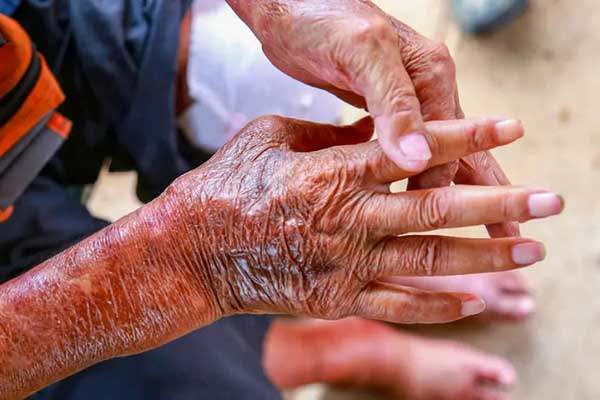
What is Scleroderma?
Scleroderma, also known as systemic sclerosis, is a rare autoimmune disorder that primarily affects the skin, blood vessels, and connective tissues. It is characterized by the abnormal buildup of collagen, leading to thickening and hardening of these tissues. Scleroderma can vary in severity and may also involve internal organs such as the lungs, heart, and digestive system.
Symptoms:
The symptoms of scleroderma can vary widely and may include:
- Skin changes: Tightening, thickening, and hardening of the skin, often affecting the fingers and face.
- Raynaud’s phenomenon: Color changes in fingers and toes due to cold or stress.
- Digestive problems: Acid reflux, difficulty swallowing, bloating.
- Joint pain and stiffness.
- Shortness of breath and coughing (if lungs are affected).
- Fatigue.
- Kidney and heart issues (in more severe cases).
Causes:
The exact cause of scleroderma is not fully understood, but it is believed to involve a combination of genetic predisposition and environmental triggers. It is characterized by an overactive immune response that leads to inflammation and collagen buildup.
How Dr. Nagam, the Rheumatologist, Can Help You:
Dr. Nagam is a rheumatologist with expertise in diagnosing and treating autoimmune and inflammatory disorders. If you suspect you have scleroderma or have been diagnosed with it, Dr. Nagam can provide specialized care and support.
Diagnosis:
Diagnosing scleroderma requires a thorough medical history, physical examination, and various tests, including:
- Antibody Testing: Blood tests to detect specific antibodies associated with scleroderma.
- Skin Biopsy: A small sample of skin may be taken to assess collagen buildup and changes in skin tissue.
- Imaging: X-rays or other imaging tests to evaluate the extent of organ involvement.
Treatment:
While there is no cure for scleroderma, treatment focuses on managing symptoms, preventing complications, and improving quality of life. Dr. Nagam will create a tailored treatment plan based on your specific symptoms and needs. Treatment options may include:
- Medications: Immunosuppressive drugs, anti-inflammatory medications, and medications to improve blood circulation may be prescribed.
- Physical Therapy: Exercises to maintain joint flexibility and range of motion.
- Skin Care: Moisturizing and protecting the skin to manage dryness and prevent complications.
- Lifestyle Modifications: Quitting smoking, maintaining a healthy diet, and managing stress can help.
Monitoring and Follow-up:
Scleroderma requires ongoing monitoring to detect any changes in symptoms or organ involvement. Dr. Nagam will schedule regular follow-up appointments to assess your condition and adjust your treatment plan as needed.
Patient Education:
Understanding scleroderma and its potential effects is crucial. Dr. Nagam will provide you with comprehensive information about your condition, treatment options, and self-care strategies to help you manage your health effectively.
By collaborating with Dr. Nagam, an experienced rheumatologist, you can receive the specialized care and support needed to manage scleroderma and maintain your well-being.


